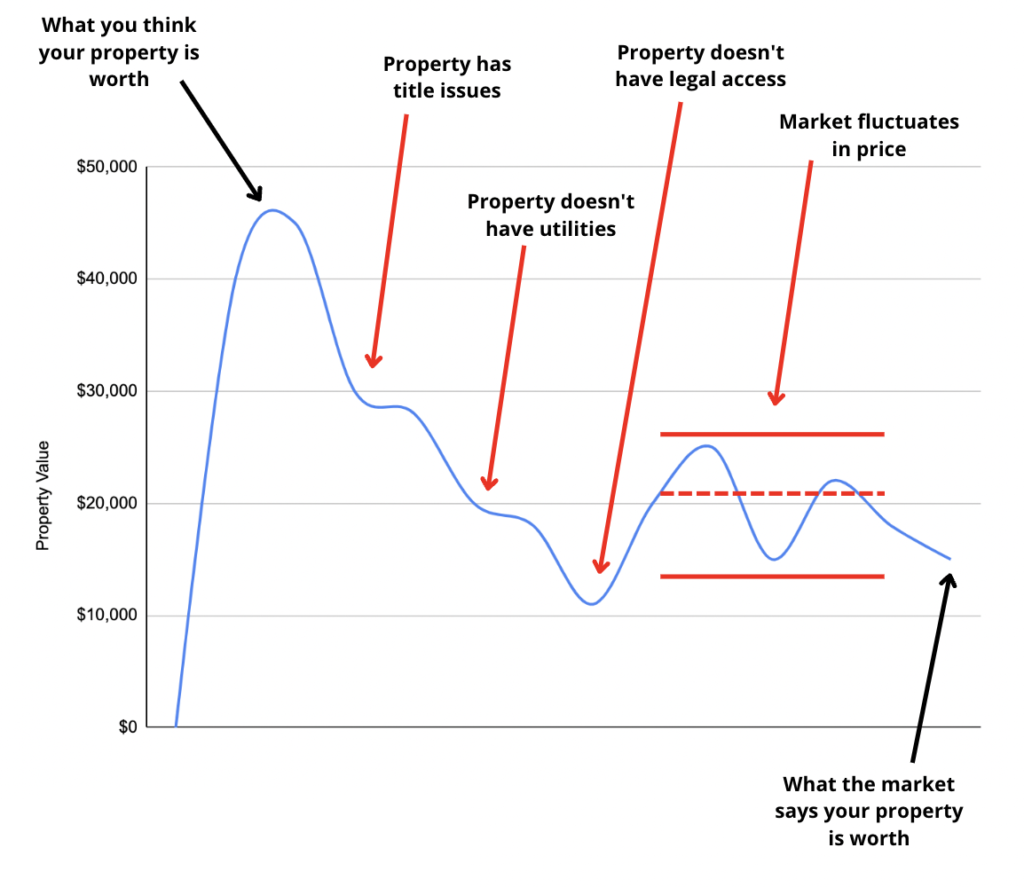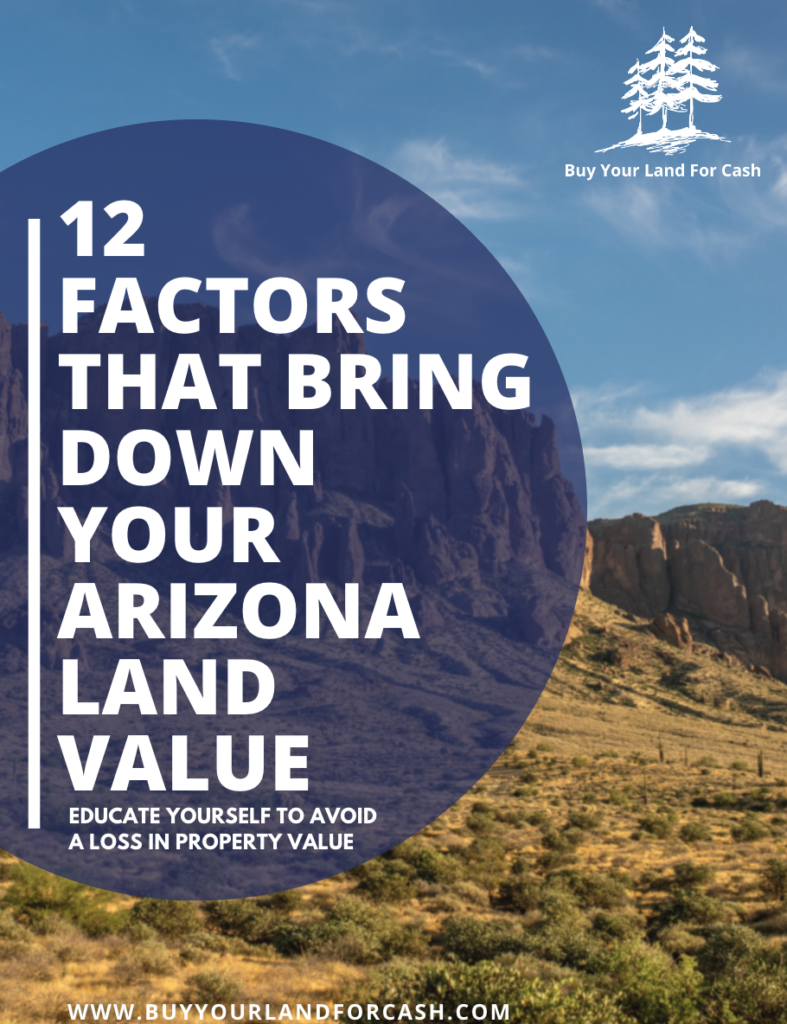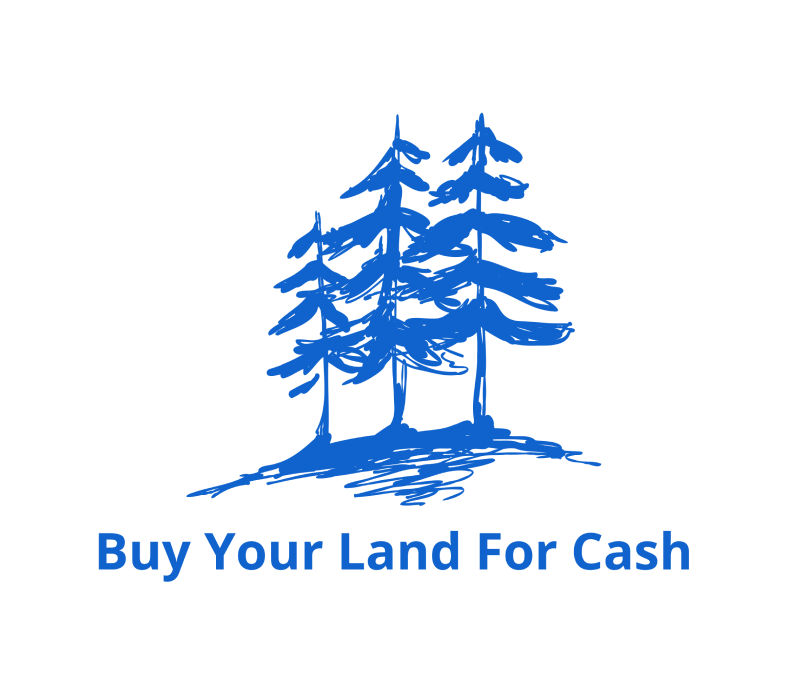In this video, Felicia talks about the different factors that could affect your Arizona land value. If you’re looking to sell your Arizona land or want to know how to find out what your Arizona land is worth, knowing what factors affect value can help you determine a number.
From the video:
Hey everyone it’s Felicia from We Buy Your Land for Cash.
Today I want to share some factors with you that will help you figure out the value of your Arizona land.
As a land owner in Arizona, there are 12 key influencers that you need to watch out for. These things can make or break your land value. When my company invests in Arizona land, we check these things carefully.
If you want the pro tips for each of these 12 factors, make sure you fill out the form below to grab your free copy of the guide.
Download Your FREE Arizona Land Value Guide
Just put in your name and email, click “Download” and we’ll send you the free guide right away.
Chain of Title
This is the biggest factor. Not all deeds and property transfers are created equally.
The best type of deed is a Warranty Deed. This means that when you purchased the property, the seller pledged or warranted that they owned the property free and clear of any outstanding liens, mortgages, or other encumbrances against it, AND that they warrant this for the history of the property.
Transfers done through a Tax Deed / Lien or Treasurer’s Deed aren’t great. These don’t give you clear and marketable title and will cause a lot of problems if you try to sell your property.
Accessibility
Some properties are only reached by a county easement or an unofficial (privately owned) trail. This normally isn’t a problem for most Arizona properties, but you still need to be aware. If you can only access your property through a creek or by crossing a neighbor’s property, your land value is inherently capped.
If your property is a far reach from any nearby towns or cities, this could be another negative impact on your land value. A lot of people want rural, but they need access to things like grocery stores and gas stations at the bare minimum.
Dues
Outstanding dues against a property have a huge impact on its value. A lot of people don’t know that the outstanding dues get transferred to the new owner when a piece of land is sold.
If you don’t keep up with your property taxes, a Tax Lien can be filed against your property. A Tax Lien is a legal claim against your property while there are debts owing. This can be filed by the County or an individual looking to own your property.
If you pay off your taxes, you can have the lien removed. If you do not pay off your taxes, your property can be seized by the County or sold to another party who has filed a lien against it, at a severely discounted price. The only way you can prevent a Tax Lien from being filed against your land is to keep up with the burden of annual taxes, and pay them every year.
Land Use
Land can only be used for specific purposes, and unfortunately you don’t get to decide what those purposes are. Land use can be restricted at the County or at the municipal / metro level.
A lot of people think they can drive their RV down to Arizona and park it on their land, coming and going as they please.
This is not a guarantee. We know from experience that many Counties in Arizona will not allow you to permanently camp or RV on your property. There are often limits on the number of consecutive days allowed for camping and RV.
You have to be weary of the municipal restrictions as well. Some towns or cities require that you keep your land manicured and mowed, even if there’s no building on the lot. If there are many restrictions, and limited uses for your lot, this could be a negative mark against you that will bring down your land value.
Soil Type
Based on the type of soil out on your Arizona desert land, it might create difficulties building or growing a garden.
Clay soil is more heavy, and it’s harder for plants to take root. Sandy soil drains quickly, and doesn’t hold nutrients for plants well. Loamy soil is rich, dark, and crumbly, and is the best type for growing.Depending on the soil type and the zoning of your property, your land value might be lower than you’d hoped.
For example, if you have an agriculturally zoned property, and sandy soil, you’re going to have a tough time growing crops there, and this could negatively impact your land value.
Utilities
Power is not a given, even in residential areas of Arizona. It’s definitely not a given for larger and agricultural plots out of the cities, in the desert
It can be really expensive to have electricity brought in, and a lot of Arizona Counties don’t approve alternative power sources.
City water and sewer is the best option for Arizona land, but not having these isn’t as bad as not having power. In this case, you could install a septic or drill a well. However both of these are pricey, and could be a negative factor in determining your land value.
Chances are your Arizona lot has internet access and cell phone coverage, especially if it has other utilities in place. This is more of a problem in super rural areas (think “flyover states”). If your property is accessible to towns and cities, you shouldn’t have to worry about it.
Desert Wash
Most parts of Arizona get over 300 sunny days per year. But, when there is rain, it will come flowing into the washes. Water flowing into the wash is really powerful, you don’t want to underestimate it. The flooding around the wash is also strong and can take down trees and displace cars.
A lot of people think that they can ignore a wash and drive up it – you don’t want to do that because it’s unsafe in the case of a flash flood, and you could get stuck.
Having a wash on your property could bring down the value because the weather is unpredictable. Potential buyers may be turned off by the wash because they don’t want to put in the effort and financial investment to develop the property and make it their own, only to have their efforts destroyed by a once in 100 year flood.
Junk
We have made the mistake of buying property with junk and abandoned trailers and cars on it, and let me tell you from experience, it was costly to have it all cleaned up.
Abandoned vehicles, boats, sheds, trailers – all large objects like this that take work to remove from the property and can’t be solved with a garbage bag could really hurt your property value.
If there’s a building that is structurally sound, like a tool shed or small barn, that might not necessarily devastate your value. If the building is not structurally sound, you need to be very careful because if anyone is hurt on the property, you are held responsible – even if that person wasn’t supposed to be there!
Neighbors
Unfortunately, how a neighbor uses their property affects the value of your property. Thankfully, there are often zoning codes and restrictions in place that prevent things from getting out of hand, but the rules might not cover every distinct situation.
Imagine you’ve purchased a lot in Arizona that you want to use as a family weekend getaway cabin. You go through the effort and costs of building a cabin, only to realize that one of your neighbors has decided to use their property as a halfway house, or maybe they’re just really rowdy. They’re outside with loud music, drinking and socializing, all day and all night. This isn’t the type of environment you’ve envisioned for a weekend in nature. Not exactly relaxing, is it?
If your noisy or annoying neighbor isn’t breaking the zoning rules or municipal bylaws, often there’s not much you can do about this, even though it’s terrible for your property value. You could try filing a complaint with the sheriff or local police office, but they might not be able to help you if no laws are being broken.
Market Prices
Similar to bad neighbors, this is a tough one to accept because it’s out of your control. This is why location is so important for land ownership. If your property is in a metro area, you can expect more volatility than in a completely rural away far from cities and towns.
That volatility can work in your favor, or against it. You get to ride the high when times are good, but when times are bad, the floor is really going to fall out from under you.
If the marketing is reacting poorly, it’s going to be tough for you to sell your property. In these situations, you likely won’t get whatever the current market value is. You could try holding on to your lot and hope for better times (if you don’t need the cash from a land sale right away).
In a bad market, your property value goes down. Even if your property has no issues, no outstanding taxes or debts, you could still lose money on it.
Natural Disasters
Natural disaster recovery is becoming more and more important. You may not think of flooding in Arizona, but this state is prone to flash floods. Flash floods are extremely dangerous.
FEMA and USGS have data showing the increasing frequency of floods. Unfortunately, a lot of areas outside the high altitude mountains and near the canyons in Arizona are in a high or relatively high risk area.
This means that the ability to recover from flooding is a must-know for land owners.
Rebuilding after flooding takes quite some time. And if the city or County can’t support a healthy recovery, your property could be covered with debris for months (or years!), leaving your land value negatively affected.
Topography
Sloping is not something that can be easily fixed. If it is fixable, it would require a ton of fill dirt, and that would be extremely expensive. For most buyers, this solution would be out of reach.
If sloping is severe and not fixable, your property value is capped because the property uses are limited.
For example, if your lot is too sloped for building (or would cause a building project to be astronomically expensive), that takes out a ton of value to potential buyers. It would also be challenging to pitch a tent or camp on such an incline.
I know this might feel overwhelming. A lot of land owners who may have inherited or been gifted property, or who bought it sight unseen may not be aware of these factors, and how they can negatively impact land values.
If you are one of these land owners – don’t be hard on yourself. It’s extremely difficult to keep track of all the factors affecting land value.Tracking land value is tricky, it’s like trying to track a moving target.

If you own land in Arizona, and don’t want to deal with the headache of valuation and trying to account for all these changing factors don’t worry – you have other options!
The quickest and easiest option for you to get rid of your land headache is to sell to an investor (like our team at We Buy Your Land for Cash).
With an investor you can expect:
- No commissions or fees
- No closing costs
- No hassles
- No marketing or work to sell the property
- Can be done in less than 10 business days
- You get cash in hand
If you’d like more information on how this works or want to know what kind of cash offer we can give you for your Arizona land, you can fill out the short form – click here.
Hopefully, this video helps you understand some of the different factors that could affect your Arizona land.
Don’t forget to grab your free copy of the Arizona Land Value Guide. Just click the link below, and then tell me where to send that guide to. I’ll have it in your email inbox within an hour.
If you liked this video please give it a thumbs up, leave a comment and let me know if this was helpful for you, I want to hear from you guys to learn what content is useful you so I can get the best content possible for you.
Make sure you subscribe so you can see more info like this, and all of our newest property tours.
If you have any questions about these 12 factors, leave a comment below and I’ll help you out. Thank you for watching, and I’ll talk to you soon. 🙂
Want to learn more about how to sell your Arizona land fast? Call or text us at (313) 307-6737 to see how Buy Your Land for Cash can help you!

Want Your Own Arizona Land Value Guide? (complete with a list of factors that could bring down your property value!)
You can get it yourself for free – just fill out the form below!
Download Your FREE Arizona Land Value Guide
Just put in your name and email, click “Download” and we’ll send you the free guide right away.


